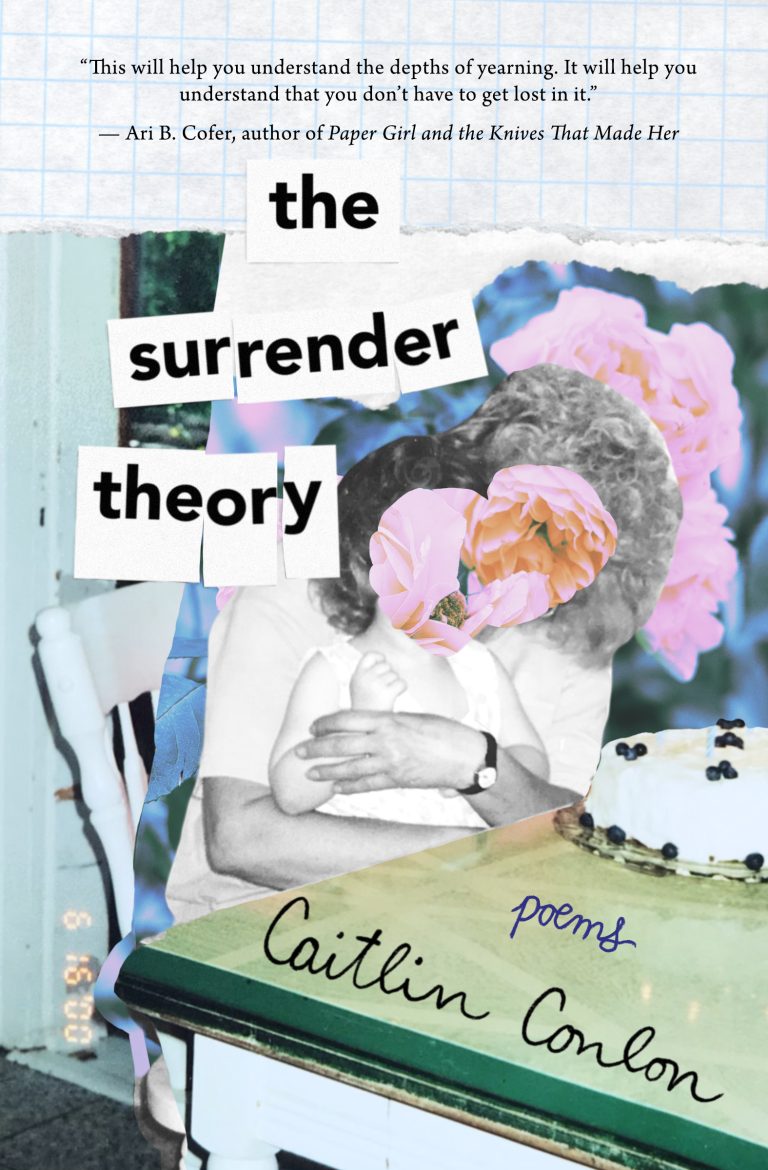The Surrender Theory,
Reviewed by Padmaja Battani
|
|
‘The Surrender Theory’ by Caitlin Conlon is an exhaustive attempt at pouring out her emotions, deeper hurts, and vulnerabilities through beautiful poems interspersed with hand-written doodles. The book recounts her emotional voyage navigating through grief, loss, heartbreaks, and anxiety. Her tone is intense, bruised and comforting.
Her opening poem talks about the thing she is most scared of – her heart. The description of her heart as a ‘monster of tenderness’ speaks volumes about her vulnerability. She needs no excuse to sacrifice herself for love and she is a martyr for everything soft. This confession announces the theme quite brilliantly and serves as prelude to the entire collection. The one-sided conversation with her journal and doubting whether she is on the wrong side of her life implies that the poet is in deep melancholy. She is not sure whether it is too late to surpass her fate.
Her verse captivates readers by narrating the memories of her grandmother in ‘Observation’. Every description resonates with love, grief or heartache in one way or the other. Here, she presents her grandmother as the person who has known almost eighty Valentine’s Days—a lot of love.
Her grief spills off the page in the way she describes the loss of her grandmother—‘a million little deaths become a cloud’ and in the earnest attempts (of someone in enormous grief) to erase the past into memories. Yet she finds her at the bottom of every glass she drinks. She also confesses that her grandmother ‘only exists in the remnants of thirst long enough for me to miss her’. Many lines like these are packed with strong metaphors, lyricism, and imaginary that connect to readers innately.
It is interesting to note that she kind of realizes that she is granting the person (whoever has left her) immortality by writing about him and trying to give him an ending worthy of history. Every poem she has written is about the same thing – film receipt from the first date, counting days since last kiss, smelling like you from the complimentary shampoo (the same kind that you use). This is like gathering a garland of thorny reminiscences. Her meditation on ‘titles for future breakup poems’ looks at heartache and anguish from a crude and yet honest standpoint. She is clinging to any story or song that remotely resembles theirs with bitter heart and blistered hands. She keeps talking because the silence is underwhelming. She writes as she does not know what to do with her hands. There are memories she doesn’t want to bury. Gorgeous vulnerability appears all through these poems in an unparalleled manner. Another remarkable poem ‘Nesting Doll’ also speaks about the grandmother’s death depicting it as the biggest grief. There are remarks about treating truth carelessly in youth and an inability to say right thing at correct time which leads to (all this) writing. Though these traits seem to be deeply personal, they have a universal appeal. Anxiety and agony have a dominant presence throughout the book and in one of the poems she aptly describes depression as ‘a waiting room television that never shuts off’. Anxiety waking her up, the inability to sleep, worrying about wasting days and doubting whether there is enough time left in the short life (to waste like this) echo the experiences of anyone who has known anxiety, depression, and apprehension.
Her ability to create poetry with mundane things like acne and dry shampoo and yet able to tap dark emotions connecting to an enormous topic as depression is remarkable:
‘Final wishes for ex loves’ is yet another poem that emphasizes the benevolence of a person with true love. The wishes range from ‘kitchen full of food’, ‘decent seats at every movie theatre’, ‘flowering gardens’, ‘full and meaningful life’ and finally ‘happiness in every shade of color there is.’
Throughout the book, grief is never absent, it is always there, sometimes lingering in the background. ‘In defense of breakup poems’ heartbreaks are shown as the strength that enable one to stand on top of grief and sing with one’s entire heart. One single sentence that can sum up the central theme is ‘It’s true that I kept the bedroom door unlocked for Grief’ from the poem titled ‘Short Reflections of Grief’. Very simple phrases like ‘ I whisper your name into the dark and it never thinks to come back’, ‘You should know that I’m not ashamed of my heart anymore’, ‘I could mourn myself in peace’, and ‘you make me believe in love again’ manifest the vivacity of misery and the newfound love beautifully. She knows her voice and craft so well and thus succeeds in making readers ache for her. Her playing with space and line breaks, page breaks and usage of doodles add so much texture to the work. Several powerful expressions like ‘to lick the wounds of a battered heart’, ‘you can lose things while holding onto them’, ‘I feel like a papercut that never stops bleeding,’ and ‘A warm house that smells like desire’ candidly delve into the oceans of human emotions. It is true that not all pieces of this collection are equally strong. There are a few that do not keep reader’s attention for the duration of the poem and feel a bit long. Some poems are overexplained. ‘Red Room’ is one such example. The color red is so striking that it paints the whole poem right away. The poem ‘Penelope’ also feels prolonged and at times the initial idea ends up getting lost. Short poems such as ‘Field Notes’, ‘Shame Lineage’, ‘Depression Revisited’, ‘Echo’ and ‘Routine Maintenance’ have tapped into the essence of agony and undeniable sadness so exquisitely. The book’s many poems epitomize the accuracy of a needlepoint and the expansiveness of the sea. Padmaja Battani, originally from India, lives in Connecticut/Ottawa. She received an MA in English Literature. Her prose and poetry appeared in Sierra Poetry Festival, Trouvaille Review, New Pages, Coffee People Magazine, League of Canadian Poets, Black Cat Magazine and others. Her latest passion is hiking. She is currently working on a Poetry Collection.
|


